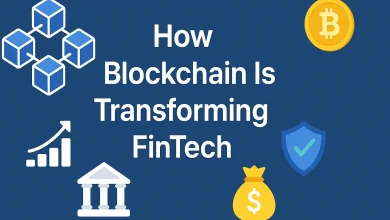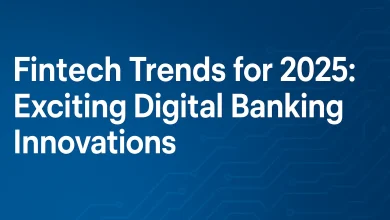5 Key Trends in FinTech You Should Know in 2025
As we are now in 2025, the FinTech trends continue to reshape the financial industry. Advancements in technology, such as AI, blockchain, and sustainable finance, are transforming how financial institutions and consumers interact. This article highlights the most significant FinTech innovations that are already shaping the industry today, so you can stay ahead of the curve.
 |
| 5 Key Trends in FinTech You Should Know in 2025 |
1. AI and Machine Learning in FinTech Trends
Artificial Intelligence (AI) and Machine Learning (ML) are already having a profound impact on the financial services sector. In 2025, these technologies are deeply embedded in financial technology trends, driving efficiencies, enhancing automation, and delivering more personalized services to customers.
As part of the current FinTech revolution, AI and ML are automating many traditional processes, increasing efficiency across the sector. These technologies allow businesses to analyze vast amounts of data, detect fraud in real-time, and provide customers with tailored financial services.
Key Points on AI and Machine Learning in FinTech Trends:
- AI-driven automation is streamlining customer support services, including chatbots providing 24/7 assistance.
- Machine learning algorithms are helping detect fraud by analyzing patterns in large datasets.
- Personalized financial solutions are being enhanced through AI, giving consumers more control over their financial health.
Summary: AI and ML are significantly influencing FinTech industry trends, making services more efficient, secure, and personalized in 2025.
2. Blockchain Technology in FinTech Trends
Blockchain technology has evolved significantly from its initial use in cryptocurrencies. In 2025, blockchain is a key FinTech trend in areas such as digital identity management, cross-border payments, and smart contracts. This decentralized technology is enhancing security and transparency, two crucial factors for the future of financial services.
As financial technology trends continue to unfold, blockchain is eliminating the need for intermediaries in transactions, reducing operational costs for banks and financial institutions. Blockchain is not only improving payment systems but also redefining how contracts are executed across the industry.
Key Points on Blockchain’s Impact on Financial Technology Trends:
- Blockchain is streamlining cross-border payments, reducing costs and transaction times.
- Blockchain is enhancing security by enabling encrypted digital identities and ensuring data integrity.
- Smart contracts are automating transactions, reducing human error and ensuring compliance.
Summary: Blockchain technology is playing a pivotal role in shaping financial technology trends, enhancing security, efficiency, and transparency.
3. Open Banking and APIs in FinTech Trends
Open banking, driven by APIs (Application Programming Interfaces), is a FinTech trend that’s currently revolutionizing how financial data is shared and utilized. By enabling consumers to securely share their banking data with third-party providers, open banking is creating new opportunities for innovation in financial services.
As part of current FinTech trends, open banking is increasing competition and offering consumers more choice. Expect to see an influx of fintech apps designed to help users manage their finances more effectively by providing tailored insights, investment opportunities, and budgeting tools.
Key Points on the Future of Open Banking in FinTech Trends:
- Open banking is boosting competition, enabling smaller companies to offer financial products traditionally dominated by large banks.
- APIs are enabling seamless integration, allowing third-party apps to offer more personalized financial services.
- Consumers have more control over their data, allowing them to easily switch providers and access better services.
Summary: Open banking, powered by FinTech industry trends, is empowering consumers and fostering innovation across the financial sector.
4. Digital Wallets and Contactless Payments in FinTech Trends
In 2025, digital wallets and contactless payments have become the standard way of transacting. This FinTech trend is growing as more consumers seek seamless, secure, and convenient ways to make payments. Digital wallets now integrate with smartphones, allowing users to store multiple payment methods and make payments simply by tapping their device.
The FinTech innovations include advancements in digital payment systems, such as improved biometric security and the adoption of cryptocurrencies as alternative payment methods. These innovations are changing how both consumers and businesses view payment systems, making cashless transactions the norm.
Key Points on the Growth of Digital Wallets and Payments in FinTech Trends:
- Digital wallets are replacing physical cards, providing an easy, secure way to store and use multiple payment methods.
- Contactless payments are becoming ubiquitous, reducing transaction times and enhancing convenience.
- Biometric authentication is increasing security, making payments more secure and hassle-free.
Summary: FinTech trends have led to widespread adoption of digital wallets and contactless payments, offering a seamless and secure payment experience.
5. Sustainable Finance in FinTech Trends
As sustainability becomes more important, green finance is rapidly emerging as a significant FinTech trend in 2025. Consumers and investors are increasingly interested in making environmentally responsible financial decisions. Financial technology platforms are responding by offering green bonds, sustainable investment tools, and eco-friendly financial products.
In line with current FinTech trends, financial institutions are under pressure to integrate sustainability into their practices. This includes adopting green bonds and investing in environmentally conscious projects, creating more sustainable financial systems for the future.
Key Points on the Future of Green Finance in FinTech Trends:
- Sustainable investment options are growing, with an increasing number of FinTech platforms offering eco-friendly financial products.
- Green bonds provide an avenue for impact investing, allowing individuals to support environmentally responsible projects.
- Financial institutions are prioritizing sustainability, aligning their business models with both consumer demand and regulatory pressures.
Summary: Sustainable finance is becoming a dominant FinTech trend, offering consumers more responsible financial choices while contributing to global sustainability.
Conclusion
The FinTech trends of 2025 are bringing exciting advancements in AI, blockchain, open banking, digital payments, and sustainable finance. These innovations are revolutionizing how we engage with financial services, offering faster, more secure, and environmentally-conscious options. Staying informed about these trends will allow businesses and consumers to capitalize on the future of financial technology.
Frequently Asked Questions about Key FinTech Trends in 2025
What are the key FinTech trends businesses should know in 2025?
In 2025, key FinTech trends include the integration of AI for personalized financial services, the rise of digital wallets, the growth of blockchain in finance, and the focus on sustainable finance. These trends are transforming the way businesses operate in the financial sector.
How does AI impact the financial industry in 2025?
AI in 2025 is revolutionizing finance by improving fraud detection, automating financial analysis, and providing real-time insights for decision-making. It enhances customer experiences by offering personalized solutions and optimizing financial strategies.
Which sectors will benefit most from FinTech innovations in 2025?
Sectors like banking, insurance, and investment management will benefit most from FinTech innovations in 2025. Blockchain will enhance security and transparency, while digital wallets and AI-driven tools will streamline transactions and improve customer experiences.
What role will digital wallets play in 2025?
Digital wallets in 2025 will continue to grow, offering secure and seamless payment solutions. They enable instant transactions, integrate loyalty programs, and provide users with greater control over their financial management.
How are sustainable finance and FinTech related in 2025?
Sustainable finance in 2025 will be driven by FinTech innovations. Blockchain, for example, will enable more transparent and efficient impact investing, while AI will help assess the environmental impact of investments, making finance more eco-friendly.
What are the main challenges for businesses adopting FinTech in 2025?
Challenges for businesses adopting FinTech in 2025 include regulatory hurdles, data privacy concerns, and the need for continuous innovation. Companies must adapt to fast-evolving technologies to stay competitive and secure.




